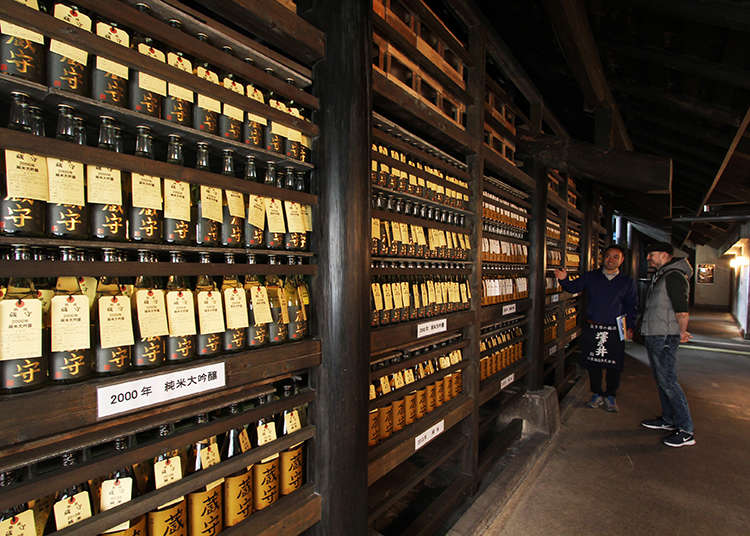
No visit to Japan is complete without trying sake. To really enjoy it, there is nothing better than visiting a Tokyo sake brewery like Ozawa Sake Brewery in Sawai, Okutama!
Sake is made from rice and Japanese people have been happily sipping away at this strong alcoholic drink for the best part of the last 1300 years.
While it has achieved worldwide fame, to a certain degree, sake served at restaurants outside of Japan is just served as sake regardless of what the bottle may say. Still, in fact, there are different kinds of sake with a range of different tastes – there are even other names for the different temperatures that sake can be enjoyed at!
For a visitor to Tokyo to enjoy a trip to a brewery, it is necessary to go a bit of a distance from the city center, such as Sawanoi. However, it is totally worth it.
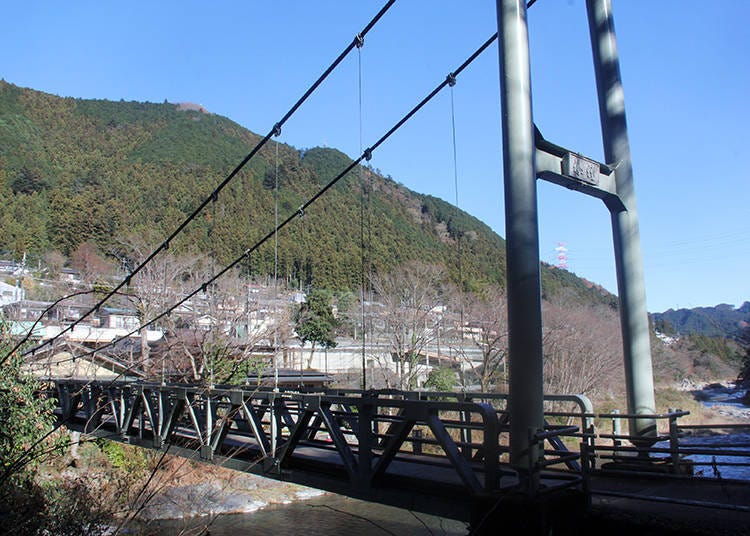
The gorgeous area of Okutama near Ome City is full of mountains and valleys, and as a rural area, it is popular with hikers for its natural beauty. It takes about 80 minutes to get here from Shinjuku.
The air smells fresh, and the water is clean, which is important as sake brewing wouldn’t be the same without pristine natural water.
Just outside of Ome City in the small valley village of Sawai you can find the Ozawa Sake Brewery which has stood at this spot for over three hundred years, and in fact right next to the brewery is a three-hundred-year-old house that belongs to the brewery’s owners!
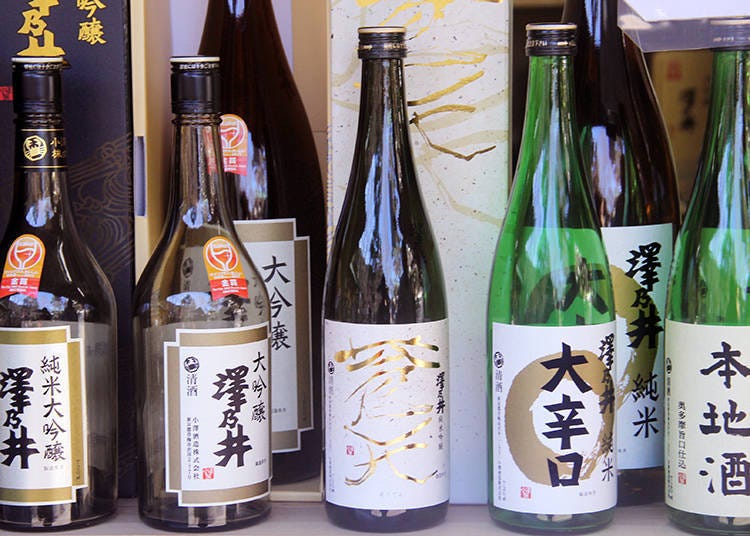
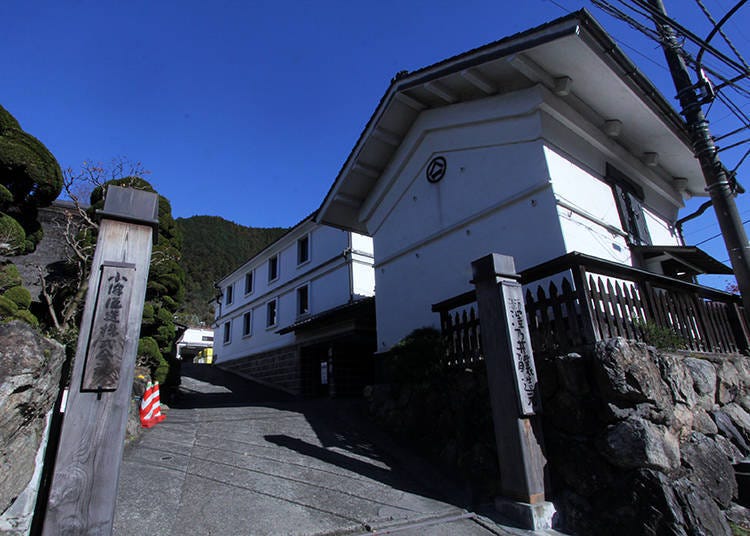
Ozawa Sake Brewery – A Free Sake Tour
Ozawa Shuzo is a sake brewery which is proud of its heritage, and quite rightly so. The fine people, so-called Kurabito, who have worked here and still work here, have over hundreds of years perfected their techniques in sake-making in order to make the best possible sake. They are also happy to give a guided tour of their brewery for free!
The tour has to be booked in advance by a web form on their website or on the day from the sake shop. It runs four times a day, but as there are limited spaces it is really best to book in advance.
At the entrance to the brewery, in the back of the impressive old family home is where the tour starts – we are about to dive into the deep cultural history of sake!
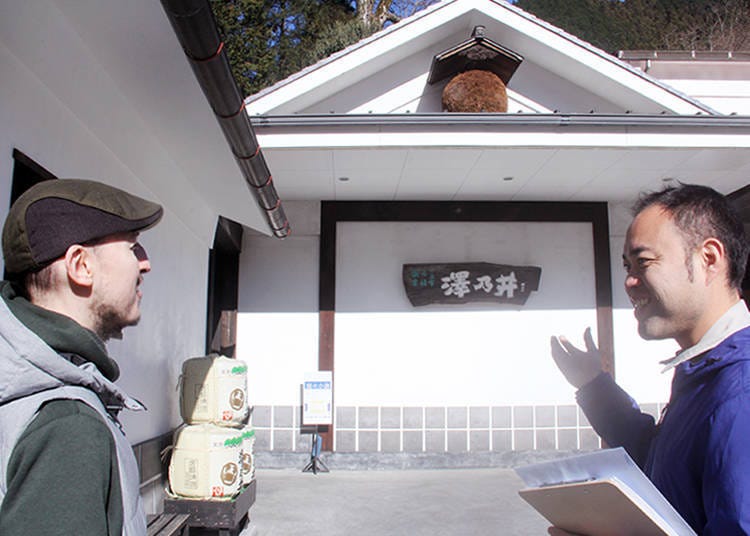
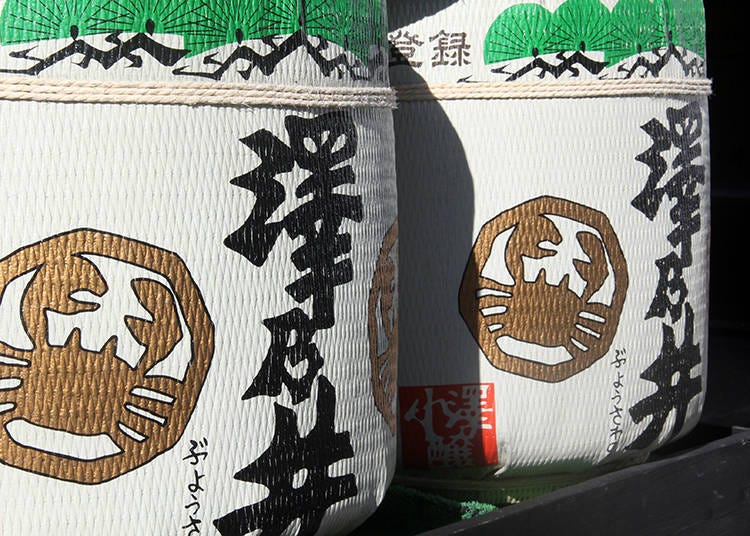
Starting the Tokyo sake brewery tour! Discovering the secret to when new sake is available
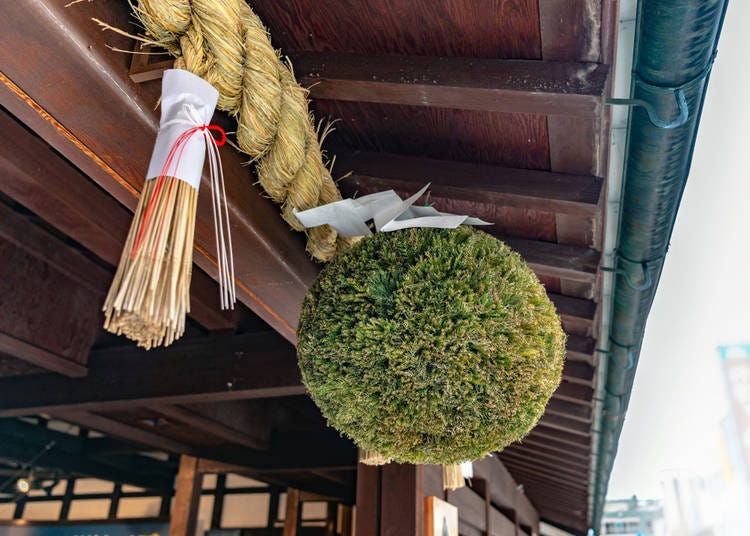
Sake is brewed from September to the middle of May, and every autumn to announce that the first sake of year is ready a sakabayashi (also known as a sugidama) is hung from just under the eaves of the brewery building.
This is made from cedar leaves and the fresh green color means to passersby that they can now buy freshly made sake, over time the leaves turn brown which means that sake enthusiasts, eager for newly made sake, have to bide their time until a new green sakabayashi appears.
Just outside the big doors to the brewery there are some traditional sake barrels, at New Year’s parties and weddings, etc., it is a custom to break open a barrel of sake in a Kagamibiraki ceremony – the top is smashed open and everyone gets a cup of delicious sake.
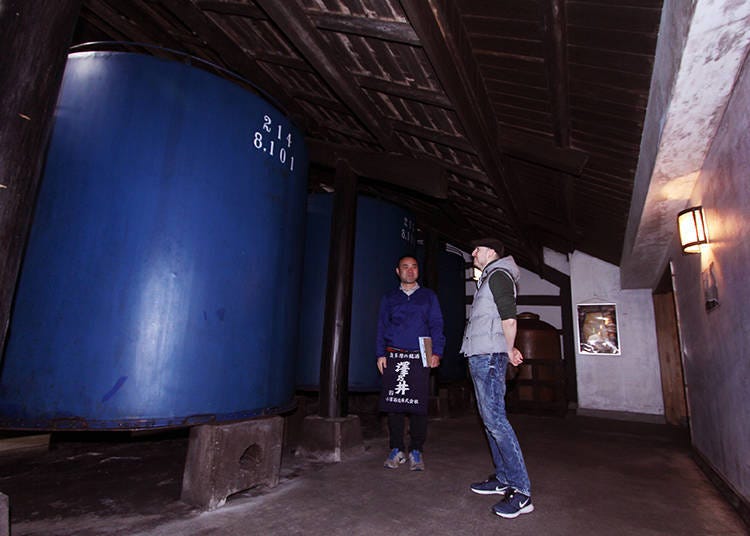
Inside the brewery there is an awe-inspiring sight or two awe-inspiring sights in fact – one is the massive tanks full of sake and the other is the interior of the building itself which dates back to three hundred years ago.
Unfortunately, it isn’t possible to actually see inside the tanks, or dive in, but for example, if someone took a cup of sake every day from one particular tank that was pointed out to us, it would take them one hundred years to drink it dry.
Above the tanks you can see the massive beams which have stood in place here for hundreds of years, these along with thick mud walls, control the temperature inside the building. It is truly remarkable that this kind of traditional building technique dates back to so long ago in the past, and that it keeps the inside of the structure so cool even in summer.
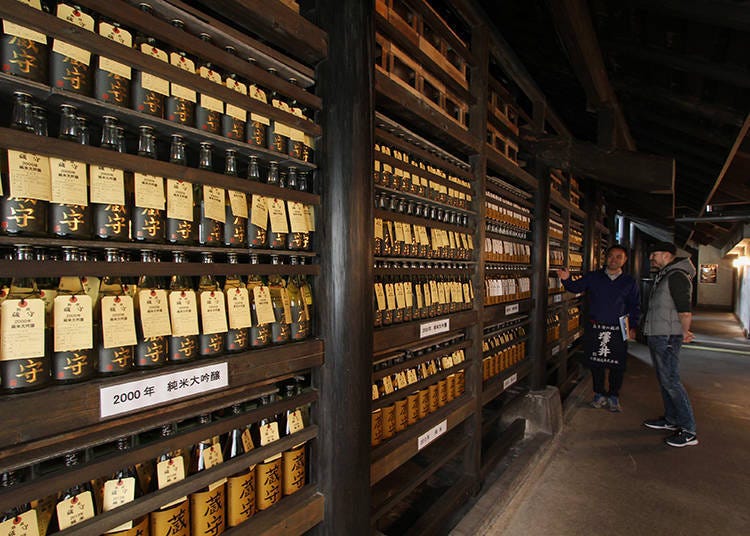
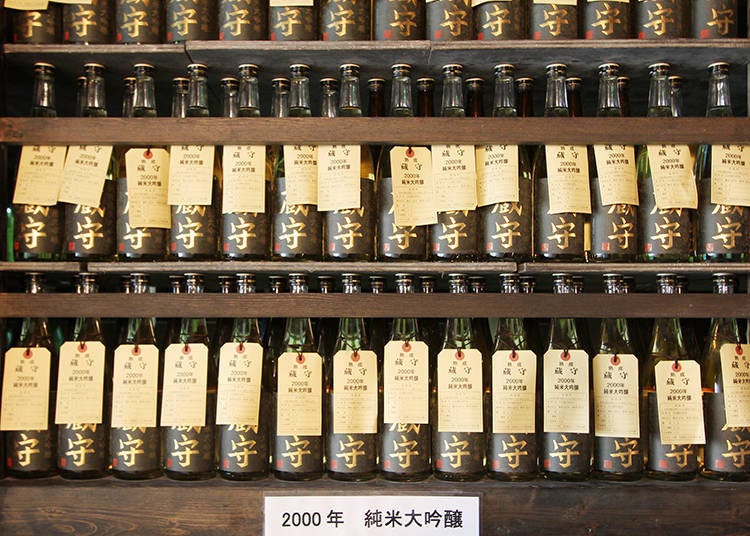
Although sake is normally drunk in the same year it is brewed, it doesn’t age in the same way that wine does, the brewery does have vintage years for special occasions.
In the same area as the massive tanks it is also possible to check out rows of bottles of sake from, for example, the year 2000, which was made to commemorate the start of the millennium – later on it is possible to try a sample of this millennium sake!
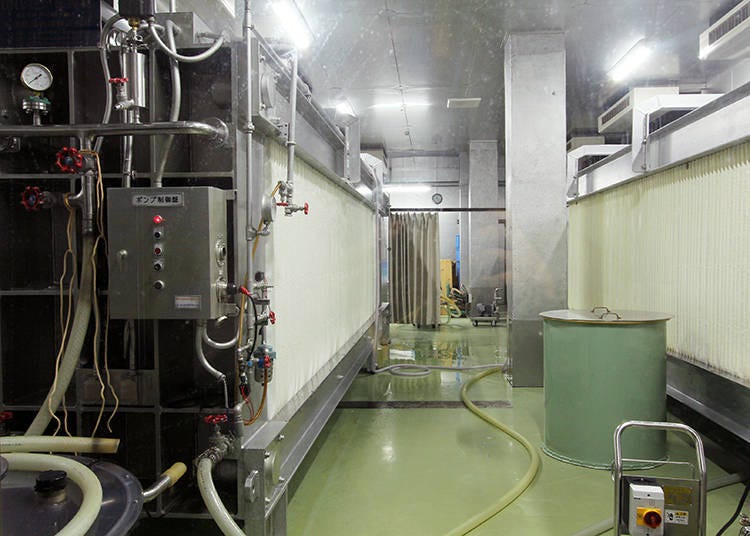
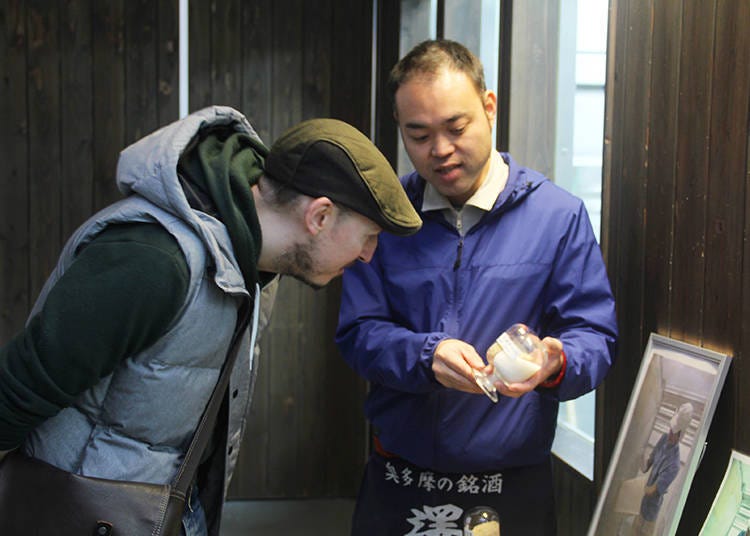
Rice Polishing?? This is why you can’t just make sake in your backyard
The next stop in the tour is where rice is ‘polished.’ To begin with, it is important to keep in mind that there are different varieties of rice, and there are varieties of rice which are for sake brewing and you really wouldn’t enjoy eating.
‘Polishing’ rice is about removing the outer layers of the rice grain, to get a high quality sake you would need to really polish the grain to its core. In the case of Ozawa Shuzo’s best sake the rice grains are polished to the point that the grain loses 65% of its weight.
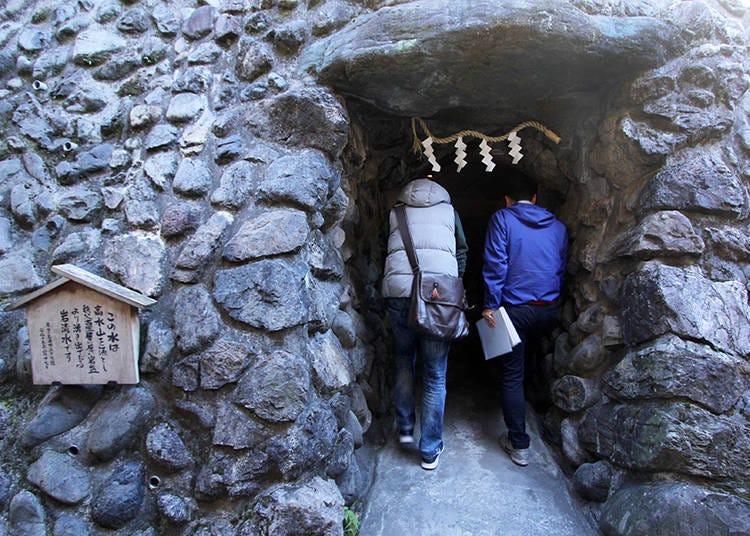
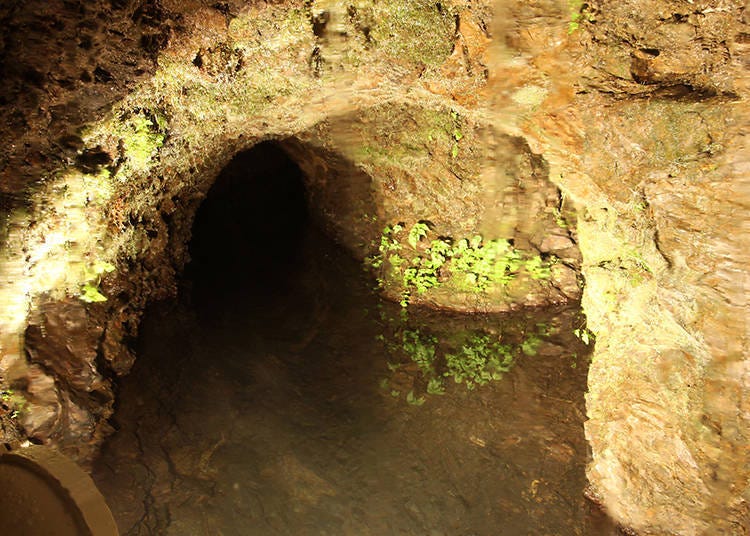
Something few people know – the importance of water for sake
As explained above, water is really important for sake and that is why sake breweries are normally found outside of cities, and part of the reason Ozawa Shuzo was founded in this spot was because of the quality of the local water.
Taking us outside the brewery building, we were led to a small tunnel which was perhaps a hundred feet in length, and at the end of the tunnel, we could see what could be called Ozawa Shuzo’s treasure: a well of clear spring water.
This particular well, which has been in use for close to two hundred years, has water that is rich in minerals and is perfect for brewing the best sake.
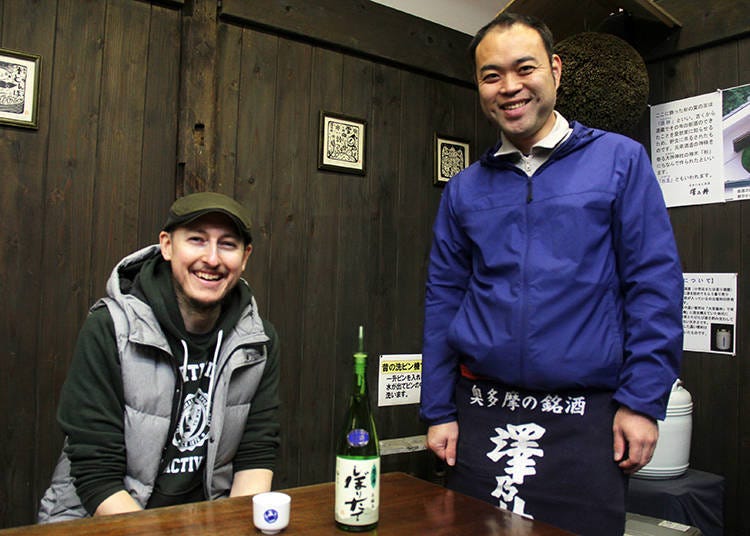
Tokyo Sake Tasting!
The final part of the Tokyo sake brewery tour is no doubt everyone’s favorite: sake tasting! As we sample some delicious seasonal sake the complexities of sake is explained. Sake has different flavors depending on how it was made, for example how much the rice was polished, or the quality of the water, etc.
These can be divided into four main types, mature which has a strong aroma and mellow, full-bodied, light and smooth which has a mild fragrance and light taste, and finally fruity which tends to have a floral or fruity aroma with a sweet taste.
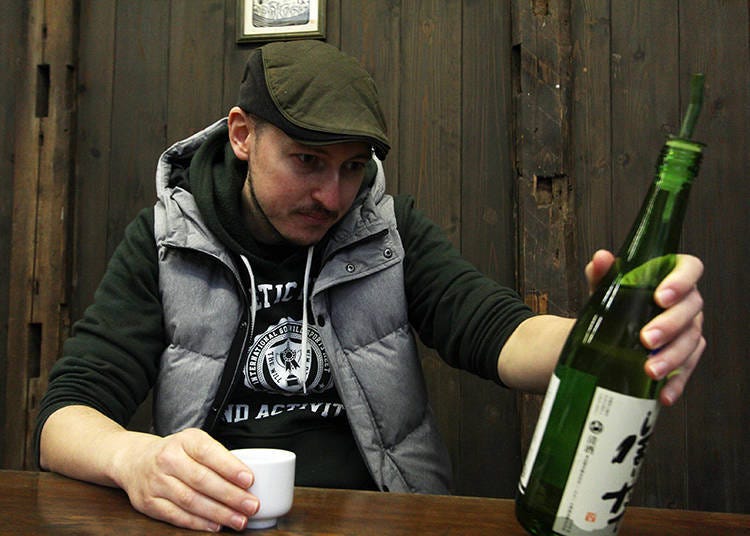
These different types also lend themselves to different kinds of food, so choosing sake is very important according to what you are eating or are going to eat.
In addition, sake can be enjoyed at different temperatures, from 5 degrees to a very hot 55 degrees. It goes without saying that the sake offered at this tasting session is truly delicious.
In addition to the sake tour, let’s try Ozawa Sake Brewery's bar!
It also goes without saying that after the sake tasting, and the tour, that one feels compelled to try more sake. Don’t worry – there is a sake bar! From the entrance to the brewery there is a flight of stairs which lead to a small tunnel that will take you to a lovely garden area by the river.
By the tunnel exit there is a spring water source where you can actually try the local water, it is really refreshing. The first building on the right houses the sake bar, here you can try from ten different sake tastes at a very reasonable price – and in addition you can keep your sake cup as a souvenir!
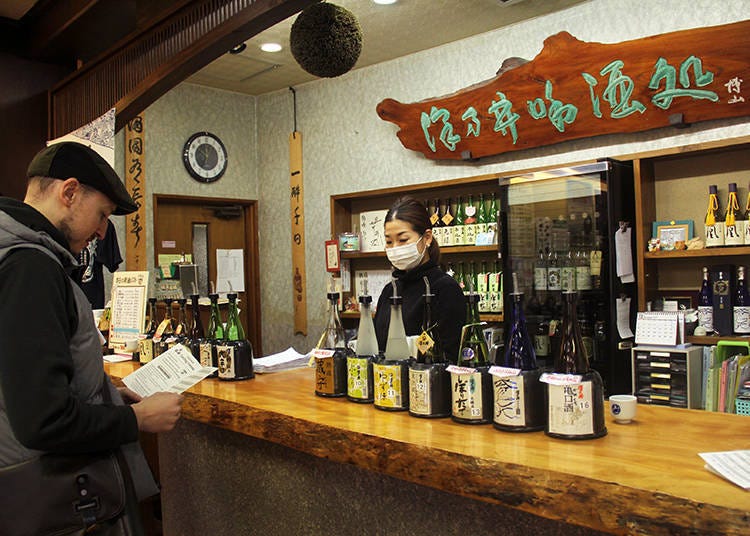
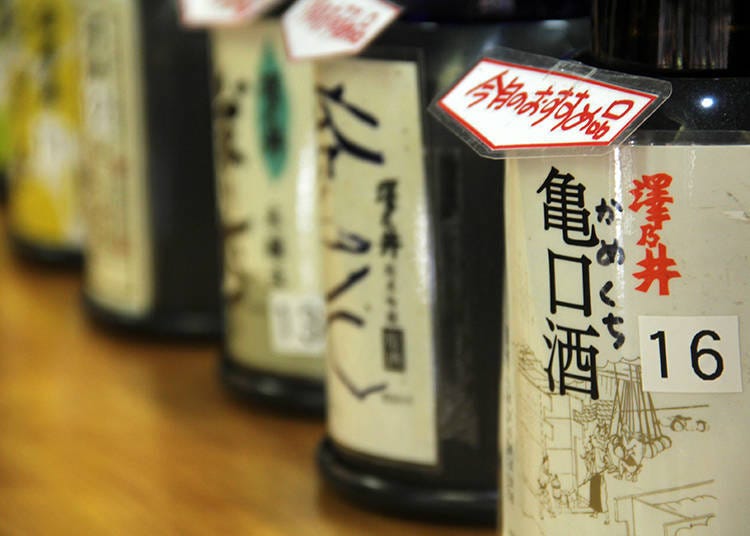

Outside there are tables and several shops. From one you can buy local delicacies, such as tofu and even sake cake, the remaining solids leftover from pressing rice to get sake, from the brewery.
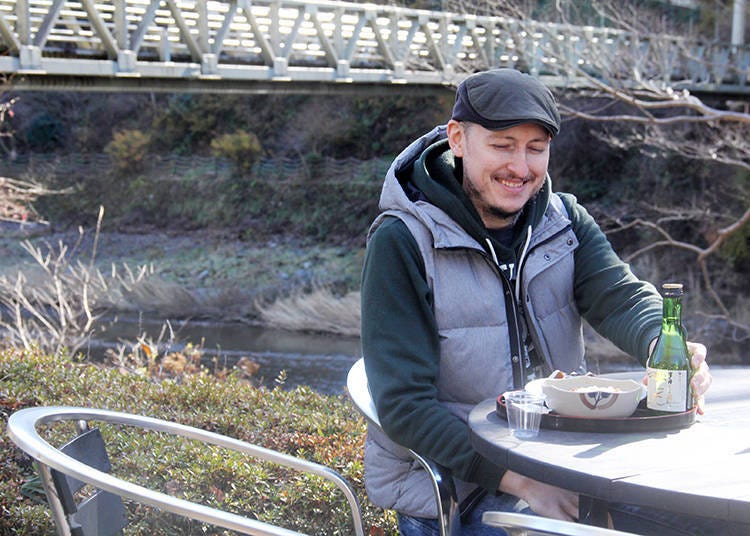
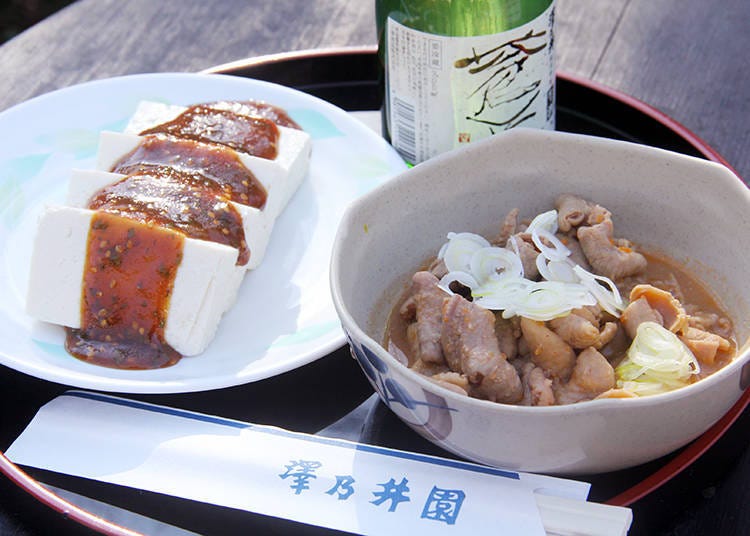
Another shop sells bottles of Ozawa Shuzo sake, a must-buy as a souvenir or as a gift for friends and family, and finally, a third one sells food which can be enjoyed at a table on the terrace. After having tasted several sake flavors, including the sake from the year 2000, there was nothing quite like sitting down at a table, eating tofu, and enjoying the beautiful valley scenery of Sawai village.
Sawanoi Garden Sake Tasting: 10.30a.m to 4.30p.m
Sawanoi Garden Snack Shop: 11:00a.m to 4:00p.m
-
Ozawa Sake Brewery澤乃井-小澤酒造株式会社
- Address 2-770, Sawai, Oume-shi, Tokyo
- Phone Number 0428-78-8215
Open Hour: 8:00a.m - 5: 00p.m
Closed: Monday (except for National Holidays on Monday, in which case open on Tuesday instead)
Sake Tour: 11:00a.m, 1:00p.m, 2:00p.m and 3:00 pm
The tour is in Japanese, but there is plenty of information given in English in pamphlets and other information sheets.
Writer: Michael Sullivan
Cameraman: Iori Iwata
- Area
- Category
*Prices and options mentioned are subject to change.
*Unless stated otherwise, all prices include tax.
Popular Tours & Activitiess
Recommended places for you
-

The Imperial Palace
Other Architecture
Tokyo Station
-
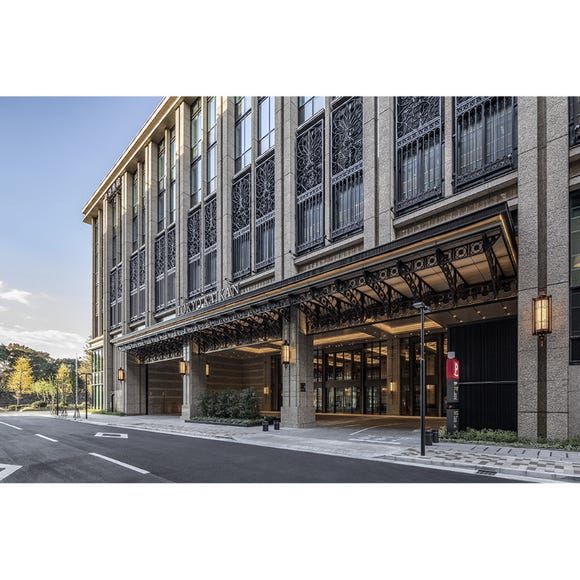
TOKYO KAIKAN
Other Restaurants
Ginza
-

Ameyoko Shopping Street
Old Towns (Shitamachi)
Ueno
-

Ueno Zoo (Ueno Zoological Gardens)
Zoos, Aquariums & Botanical Gardens
Ueno
-

Birthday Surprise x KUJIRA ENTERTAINMENT DINING
Other Restaurants
Shinjuku
-

Tokyo Metropolitan Government
Landmarks
Shinjuku
-
Ad

5 Recommended Wagyu Yakiniku Restaurants in Tokyo: Signature Dishes, Premium Beef, and Secret Sauces
-
Ad

What Makes Japanese Yakiniku So Darn Good? Guide to Cuts, Heat, and Wagyu Know-How
-
Ad

The Latest Guide to "Tourism Mobility": Traveling Japan More Freely. What exactly are Japan’s version of ride-sharing and transit deserts?
-
Ad

The Whisper of a 1,300-Year-Old History: Meet the Other Face of Nara at Night
by: Shingo Teraoka
-

To the Holy Land of Kawaii! Odakyu Tama Center Station Is Becoming a Dreamy Sanrio Wonderland
by: Guest Contributor
-

Farewell, Heavy Suitcases! Keisei Ueno’s New Service Makes Your Last Day in Tokyo Totally Hands-Free
by: Guest Contributor
-

Delicious, Convenient, and Cheap! 5 Must-Try 7-Eleven Sweets!
by: Naho Jishikyu
-

Crazy Japanese Drinks: These Expats Went Wild on Chuhai, Would You Try These?!
-

Ueno Food Recommendations: 3 Take-Out Shops in Ueno Loved by Locals
-

Complete Guide to Buying Japanese Medicine in Japan: Phrases and Vocabulary You Need to Know
-

Tokyo Station Top 10 Sweets Ranking!
-

Tokyo Tsukiji|Tsukiji Area Map & Sightseeing Information
- #best ramen tokyo
- #what to buy in ameyoko
- #what to bring to japan
- #new years in tokyo
- #best izakaya shinjuku
- #things to do tokyo
- #japanese nail trends
- #what to do in odaiba
- #onsen tattoo friendly tokyo
- #daiso
- #best sushi ginza
- #japanese convenience store snacks
- #best yakiniku shibuya
- #japanese fashion culture
- #best japanese soft drinks












